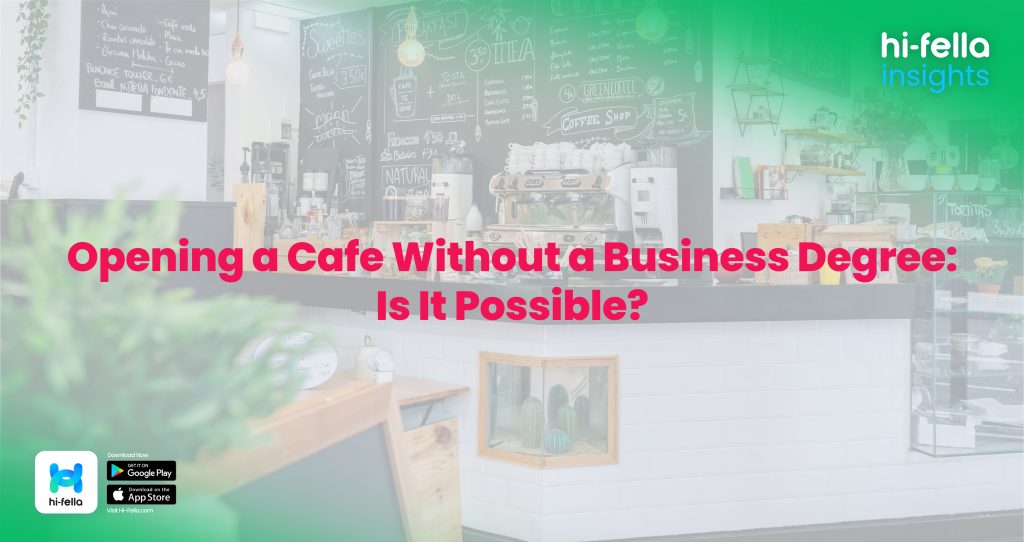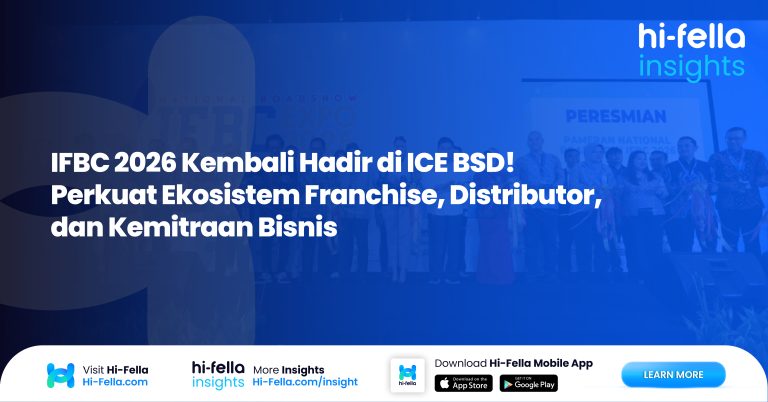Opening a cafe can seem intimidating, especially if you don’t have a formal business degree. However, many successful entrepreneurs have proven that you don’t need a business degree to start and run a thriving cafe.
If you’re passionate about coffee and customer service, you might be asking, “Can I open a cafe without a business degree?” The good news is that dedication and learning on the job can go a long way.
The key to success lies in your passion, commitment, and the willingness to learn. In this article, we will explore how you can open a cafe without a formal business education, share success stories, and provide practical advice for aspiring cafe owners like you.
Plus, we’ll show you how platforms like Hi-Fella can help streamline your operations by connecting you with the right suppliers and business partners.
Do You Really Need a Business Degree to Open a Cafe?

Source: BusinessFinder
A common question aspiring entrepreneurs ask is, “Can I open a cafe without a business degree?” The short answer is yes! While having a business degree can provide helpful knowledge, it is not necessary for running a successful cafe.
According to a study by the National Bureau of Economic Research, around 60% of successful business owners did not have a formal business degree. Many cafe owners have found ways to learn on the job, through mentoring, and by leveraging the power of self-education.
What matters most is your passion for the food and beverage industry, your ability to manage operations, and your willingness to learn. Whether you have a formal education or not, what matters is your drive and determination.
Essential Skills for Running a Cafe Without a Degree
While you may not have a business degree, several core skills are essential to running a successful cafe. These skills are crucial for managing the day-to-day operations and ensuring your business thrives:
1. Organizational Skills
Running a cafe requires effective organization, from managing inventory to scheduling staff and handling customer orders. Stay on top of your to-do list and prioritize tasks.
2. Customer Service
Providing excellent customer service is one of the keys to success in the cafe business. Being friendly, attentive, and professional with customers will help build a loyal clientele.
3. Time Management
Operating a cafe involves juggling multiple tasks at once. Managing time effectively is crucial to ensuring everything runs smoothly.
4. Leadership Skills
As a cafe owner, you’ll be responsible for leading your team. Strong leadership will help motivate staff, increase morale, and ensure the cafe runs efficiently.
Learning the Basics: Financial Management, Customer Service, and Marketing
Even without a formal business degree, you can learn how to manage finances, handle customer service, and effectively market your cafe. Here’s a breakdown of how you can acquire these skills:
Financial Management:
- Data: According to a survey by Small Business Trends, 45% of small business owners without a formal business degree rely on self-taught financial management skills to run their businesses.
- Start by learning the basics of budgeting and cash flow management. Websites like QuickBooks and Wave offer accounting tools that make it easier for you to manage finances without needing to hire an accountant.
- Use financial planning tools to track your expenses, forecast revenue, and make informed business decisions.
Customer Service:
- In a competitive industry like cafes, offering excellent customer service is vital. Salesforce reports that 88% of customers are more likely to make a repeat purchase when they experience good customer service.
- Develop communication skills, listen to customer feedback, and train your staff to handle all situations professionally.
- Creating a welcoming atmosphere will ensure customers return, which is critical for building a loyal customer base.
Marketing:
- A great product is only as good as the marketing behind it. You can learn digital marketing through free online resources like Google Digital Garage and HubSpot Academy.
- Social media platforms like Instagram and Facebook are powerful tools for reaching potential customers. Research shows that over 73% of small businesses use social media for marketing purposes. (Source: American Marketing Associate)
- Develop strategies for promoting your cafe, offering promotions, and engaging with your customers online to build brand awareness.
Resources and Tools for Self-Education in Business

Source: eLearning Industry
A formal business degree isn’t the only path to success. In fact, 40% of entrepreneurs report learning their most valuable business skills through self-education and hands-on experience (Source: SCORE).
If you’re wondering, “Can I open a cafe without a business degree?”, consider leveraging online courses and mentorship to gain the knowledge you need. Fortunately, there are numerous resources available to help you learn the basics of running a cafe:
- Online Courses: Platforms like Udemy, Coursera, and LinkedIn Learning offer affordable courses in cafe management, business finance, marketing, and more.
- Books and Blogs: Many successful entrepreneurs have written books that share their experiences. Blogs like Brew Coffee and Cafe Owner Magazine also provide tips for new cafe owners.
- Podcasts: There are podcasts dedicated to small business owners and cafe entrepreneurs that share real-life success stories and challenges faced by cafe owners.
Partnering with Experts: Finding Mentors and Consultants
Running a cafe without a business degree may seem daunting, but partnering with experts can ease the process. 70% of entrepreneurs who have a mentor are more likely to grow their business successfully, according to a study by SCORE. Here’s how to find the right support:
- Mentorship: Look for experienced cafe owners or industry professionals who can guide you and offer advice.
- Consultants: If needed, hire a consultant with expertise in specific areas like operations, marketing, or financial planning.
- Networking: Join local business networks, attend cafe industry events, and connect with other entrepreneurs to learn from their experiences.
How to Build Strong Supplier Relationships Without Prior Business Experience
Having reliable suppliers is essential to your cafe’s success. Research shows that 70% of new cafes that struggled with suppliers faced issues with product quality and delivery times (Source: Small Business Administration). Building strong supplier relationships can save you from these challenges.
- Communicate Clearly: Be transparent with suppliers about your needs and expectations. This will ensure you receive the right products at the right time.
- Negotiate Terms: Don’t be afraid to negotiate prices, delivery terms, and payment schedules to get the best deal.
- Use Platforms Like Hi-Fella: Hi-Fella connects new cafe owners with trusted suppliers and business partners, streamlining the sourcing process and reducing operational hurdles.
Success Stories: Cafe Owners Who Succeeded Without a Business Degree
It’s important to remember that many successful cafe owners didn’t start with a formal business degree. For example:
- Maria, Founder of The Cozy Corner Cafe
Maria opened her cafe without a business degree and relied on her passion for coffee and self-taught management skills. Her cafe has grown to three locations in five years, thanks to hard work and effective marketing strategies.
- John, Owner of Urban Brew
John used online courses and a mentor to learn financial management and marketing. His cafe is now one of the top-rated coffee spots in his city, all without a formal business degree.
These examples show that with the right mindset, anyone can succeed in the cafe industry, even without formal business education.
With the right skills and resources, you can easily answer the question, “Can I open a cafe without a business degree?” with a confident yes.
Ready to open your own cafe? Use Hi-Fella to find reliable suppliers and business partners who can help you get started, even without a business degree. Sign up today and start building your cafe dream!








